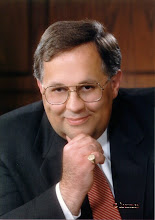
by Bill Seebeck
We used to call him "the Republican JFK". He was youthful, handsome, athletic and a very inspiring speaker. He was also different from his more conservative Republicans. I think it was because he worked on farms and drove trucks in his youth and played college and professional football becoming a championship quarterback despite his 5'11'' height. He was the co-founder of the AFL Players Union and led it for a number of years. He was a working man, yet was probably its best dressed, always "well turned out".
He was also a decent man who cared about the people, not only in his district in Buffalo, but around the country. He was an advocate for major reforms in housing and urban affairs working within a political party that didn't want to go in that direction until they had to and then he was there, as he had always been.
I first met him at a dinner in the mid-1970's, during which we talked about social issues, especially about the plight of the cities which were then in crisis. He was a very good listener, patient and also engaging. At the time, I was on the board of the National Urban Coalition. In 1978, when serving as chairman of the Coalition's Corporate Urban Affairs Advisory Committee (CUAAC), I invited Congressman Kemp to speak at our annual meeting. I remember the Coalition's president, Carl Holman, was skeptical, asking whether Kemp could be responsive to such pressing urban needs given his place in the political spectrum. As a result of our earlier conversations, I felt Jack Kemp was a person that we should engage, that he had a different slant on things and shared my previous conversations with Carl. We met with Jack that spring.
(The first picture above shows Carl Holman describing some of the difficult social issues pressuring minorities and the deteriorating conditions of our cities. Kemp was always a patient listener. The second picture shows Jack Kemp, N. Carl Holman and the author.)
Carl called me the day after the meeting pictured here and said that he was surprised by how much common ground there was between the Congressman and the objectives of the Coalition. He told me, Kemp said that his door was always open to Carl. In fact, after that, they had regular meetings and members of the Coalition board testified on behalf of Kemp when he was nominated to be Secretary of Housing & Urban Development under President George Herbert Walker Bush in 1988. Although that Bush administration did not move on many of the projects Kemp sought as Secretary, the successor Clinton administration did.
Jack Kemp was a great leader. He was also a very nice man, who genuinely seemed to care about each person he met and about his fellow countrymen and women. Let's not forget the smile. It could break across his face and light him up and all of those around him. It was infectious. You were ready to follow him forward. If you ever wanted an example of a compassionate leader, he was it. That's why today, we have alot of work to do to stitch up that hole in our universe. May we begin by using his life as an example of the compassion we need to show one another. It will help fill the emptiness that we are experiencing today.







